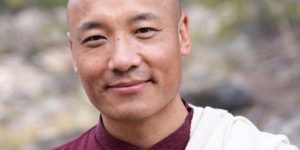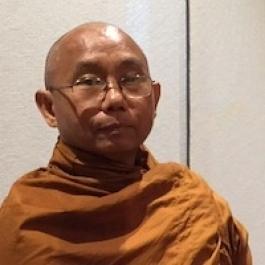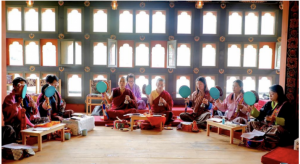
The Korean Seon (Zen) master Venerable Pomnyun Sunim (법륜스님) wears many hats: Buddhist monk, teacher, author, environmentalist, and social activist, to name a few.* As a widely respected Dharma teacher and a tireless socially engaged activist in his native South Korea, Ven. Pomnyun Sunim has founded numerous Dharma-based organizations, initiatives, and projects that are active across the world. Among them, Jungto Society, a volunteer-based community founded on the Buddhist teachings and expressing equality, simple living, and sustainability, is dedicated to addressing modern social issues that lead to suffering, including environmental degradation, poverty, and conflict.
This column, shared by Jungto Society, presents a series of highlights from Ven. Pomnyun Sunim’s writings, teachings, public talks, and regular live-streamed Dharma Q+A sessions, which are accessible across the globe. The following teaching was given in New Jersey on 1 May 2024. This article is the third in a special series taken from Ven. Pomnyun Sunim’s 2024 Dharma tour of Asia-Pacific, Europe, and North America. Titled “Casual Conversation with Ven. Pomnyun Sunim: Come Talk about Life, Wisdom, and Happiness,” the Dharma tour runs from 29 April–21 September 2024, with Dharma talks scheduled in five countries—Australia, Canada, Germany, Japan, and the United States.**

Creating a model of happy living with minimal consumption
Arriving at Pine Plaza in New Jersey, Ven. Pomnyun Sunim greeted the volunteers who were there to help welcome audience members as they entered the venue.
As the Dharma Q&A began, a short video introducing Ven. Pomnyun Sunim was shown, then he walked onto the stage to enthusiastic applause. Ven. Pomnyun Sunim greeted the audience with a bright smile and shared an update of his recent activities.
Ven. Pomnyun Sunim: I was in Bhutan last week. Bhutan is a landlocked country located between India and China. The northern part of Bhutan borders China and is strewn with peaks of the Himalayas, while the southern region consists of subtropical plains. The country is about 40 per cent the size of South Korea and consists entirely of mountains. It has a population of about 800,000, which is quite small.
Bhutan is one of three countries in the world with zero carbon emissions, which is a testament to its environmental conservation. Although it may vary depending on how you measure it, it is known as the country with the highest Gross National Happiness (GNH) in the world. It’s recognized as a poor yet happy country. However, from my experience surveying around Bhutan, I would not go as far to say that people there are extremely happy. Still, compared with other poor countries, the disparity between the rich and poor seems much narrower. I didn’t see any beggars, the roads and streets are very clean, and cultural traditions are well maintained.
The fourth king of Bhutan introduced the concept of “Gross National Happiness.” When we make investments, like hosting the Olympics or a commercial fair, we usually calculate the economic gain. We might say investing a million dollars will yield a gain of $3 million-worth of economic growth. However, the fourth king of Bhutan questioned: “How can you calculate human life in terms of money? Human life should be calculated in terms of happiness.” Thus, investment was measured by how much it increased the happiness of the residents, which became known as “Gross National Happiness.” Although it originated from a small country like Bhutan, it has influenced the international community. Now, the term Gross National Happiness is even used by the United Nations. The former prime minister of New Zealand, Jacinda Ardern, adopted happiness as a national policy goal, and countries such as Norway and Finland also focus on the GNH index when evaluating investment.
More and more countries are starting to adopt GNH, but in South Korea, people only talk about money. And it was similar in Bhutan. People there also seem to think that money will solve all their problems. That’s why Bhutan’s happiness index recently dropped significantly.
There could be a few reasons for this: first, because classes from elementary school onward are conducted in English, most young people speak English; second, electricity is available wherever people live, so they can use smartphones and the internet. Because they can speak English, even if they live in remote villages, they can access news from around the world. Thus, naturally, foreign influences seep in. That’s why there is a popular trend for young Bhutanese people to move to other countries. Especially, since Australia is actively recruiting, many young people are going there to work. A young government worker mentioned to me that all his friends had gone abroad and that he was the only one remaining in Bhutan. As a result, there are often only elderly people in rural areas—a phenomenon that is similar to that of South Korea.
The reason I became interested in Bhutan is because I want to create a model for a happy life based on minimal consumption in this era of climate crisis. Initially, I thought of selecting a county in South Korea to create this model. However, Koreans would need to reduce their consumption significantly to achieve zero carbon emissions. If we suggested reducing the level of consumption in Korea, there would be a lot of opposition. Because of this, I judged that it would be difficult to implement in South Korea.
In Bhutan, the per-capita GDP is around US$3,000, which means that people can maintain zero carbon emissions even with a slight increase in consumption. The main idea is to improve the lives of the extremely poor but not to pursue development beyond that in one sample region. I hope that people will visit the region and find it very livable, despite being less convenient. That’s the model of sustainable development I wish to create. Bhutan has clean air, clear water, and a beautiful natural environment. Although there may be fewer amenities inside their homes, an environment that most people will find acceptable is what I want to create as a model for living in Bhutan.
A way to live in the world without obstacles
In the future, as environmental pollution worsens and it becomes an everyday occurrence to wake up to the news of tens of thousands of people dying from respiratory diseases, and when frequent floods, droughts, and fires make it impossible for people to live as before, that’s when people will take an interest sustainable living. Thus, we are looking 100 years ahead in working on this project with the Royal Government of Bhutan. It’s important to prepare now for potential difficulties we might face in the future.
When I explained this, someone asked me: “What will you do if climate change turns out to be not so severe despite making all these preparations?”
If climate change doesn’t turn out to be disastrous, that’s a good thing. But if it becomes severe and life becomes unbearable, then the preparations we’ve made will shine and be worthwhile. This is the perspective of practice. If you fall into misery because your husband suddenly died, you’re not a practitioner. You should be fine whether your husband lives or dies. Why? If your husband is alive, it’s good because you get to live together, and if he dies it’s also good because you’ll get a chance to marry again. There’s no need to be sad if your girlfriend breaks up with you. It’s a good thing when you are dating because you are together, and it’s also a good thing if she leaves you because you can meet someone new. Therefore, if your girlfriend leaves you, you should thank her.
Practice is having the perspective that nothing is inherently good or bad. There are many cases in which having something is good or bad to different people. Some people are happy because they have a mother-in-law, but others suffer because they have one. If something that was good disappears, suffering will arise, and if something that was bad continues to exist, suffering will also arise. But if you change your perspective and see that having something and not having something are both good, then you won’t have any obstacles. Having no obstacles is called liberation, and having no suffering is called nirvana. The goal of practice is to attain liberation and nirvana.
No matter what happens, you must have the perspective that things going either this way or that way is good. If you have the perspective that things going one way is great but going another way is terrible, you always have to hope that things turn out in your favor. That’s why you always feel anxious. If there are good things and terrible things, you have to keep praying that things turn out well. Whether you pray to the Buddha or to God or to anyone, you have to keep asking someone to look out for you. But a practitioner has no need to pray because it’s always good, whichever way things turn out. If the bus arrives, it’s good because you can get to your destination quickly. If the bus doesn’t come, it’s good because walking is healthy for you.
When I was in Bhutan, riding in the back of a pickup truck, someone in the group asked me: “Isn’t it hard riding in the back of a truck, Sunim?” I replied: “It’s not as hard as walking.” When you are walking, carrying a heavy load, it feels incredibly good when a passing truck gives you a lift. And when you’re in a car, you can only see the scenery through the window, but when you’re in the back of a truck, you get a great view of the whole mountain. Apart from the bumpy ride and the dust, everything else is good. “It’s good if there is a seat available and I can sit inside the car because it’s comfortable; and it’s also good if there aren’t any seats available and I can ride in the back of a truck because I can see all of the scenery.” If you hold this perspective, you won’t have any obstacles in life.
In a Dharma Q&A, people usually say either of two things: that they are miserable because they have something or that they are miserable because they don’t have something. Let’s hear what people have to say today! (Laughter)
I feel wronged when a colleague takes credit for my work
Q: I’d like to know how to wisely overcome the issue of my low self-esteem, which has been damaged in my relationships with people.
Ven. Pomnyun Sunim: Can you tell me specifically what has damaged your self-esteem?
Q: There are many cases both at work and in my own business where I feel wronged.
Ven. Pomnyun Sunim: What specifically has made you feel wronged?
Q: At work, a colleague sometimes claims credit for the work that I did. In my business, the building owner harasses me terribly.
Ven. Pomnyun Sunim: Isn’t it just part of life that a boss or colleague might take credit for your achievements? This is often how things are complicated and messy in the world.
Q: There have been many instances where I’ve been held responsible for things that had nothing to do with me, and I felt wronged. After enduring such situations for years, my self-esteem has hit rock bottom, and I think I might have developed a fear of social interactions.
Ven. Pomnyun Sunim: People experience such things in life. Think back to when you were a student. Teachers sometimes misread the situation and severely punish one student when another broke the rules. When brothers fight, only the older brother may be scolded for it. Sometimes, the younger brother is scolded for standing up to his older brother. This is why when people reflect on their childhood after growing up, they say: “My parents only loved my older brother,” “They only loved my younger brother,” or “They only loved my sister,” and express resentment toward their parents. However, their parents don’t even remember what they’re talking about. The parents were just acting based on their conditions each day.
Teachers are the same. I remember when I was in elementary school, some kids were playing with jegis [Korean hacky sack] and one went up on the school roof. The kids found a pole to get the jegi down but ended up breaking a roof tile. I didn’t play jegi and wasn’t even there at the time, but because I was the class president the teacher called me to the front of the classroom and hit me four times. I felt so wronged that I wrote in my diary that I would never forgive the teacher. I even added, “I will not think less of this event even when I get older.” But if you went to that teacher now and talked about this, would the teacher even remember what happened? They probably wouldn’t. That’s life. Sometimes, unintended things happen. That’s why there are many victims in this world, but not many perpetrators. That’s how human psychology works.
Let’s say a couple argues one morning. The wife goes to work and forgets about the fight while busy with this and that, but the husband thinks about the fight all day long. The more he thinks about it the angrier he becomes and he firmly decides: “If she comes home from work and doesn’t apologize to me, I will leave her.” But when the wife comes home from work, she acts as if nothing had happened. How annoying must that be? So the husband angrily raises the issue, and the wife becomes angry, asking why he’s still holding onto it. This is how fights escalate. This is the reality of life.
From your perspective, it’s frustrating and upsetting, but there’s not really much to be frustrated or upset about. Most of the time, people take responsibility for what they’ve done wrong. But about 30 per cent of the time people are blamed for something they didn’t do, and sometimes people escape blame even when they did something wrong. Just like there were times when the older brother was punished for something the younger brother did. That’s how the world works. But if you keep feeling wronged, your self-esteem will suffer. That’s because you don’t understand the principles of the world. If that company is particularly problematic in this area, you should quit. If you’re particularly sensitive to this, then you need to change your perspective.
Q: I quit and moved to another company, but I think I’m the one who is sensitive.
Ven. Pomnyun Sunim: Both factors are at play here. The company could be particularly deplorable and you could be sensitive.
[To the audience] You should try talking to your parents about when you were scolded badly in your childhood. If you ask your mother, will she say, “I understand you were hurt when you got scolded”? Usually, she’ll say something like, “Stop talking nonsense. When did I ever do that?” and won’t even remember what happened. Children hold grudges against their parents for being scolded, and the parents don’t even remember that they did it. It never occurs to parents that their children were hurt by something that they did. If a child says they felt hurt, their parents often answer, “I did it for your own good!” Parents shouldn’t respond that way. If your child raises an issue, you should acknowledge their feelings and soothe them: “I see that you feel hurt because of that. What else hurt your feelings? Tell me more.”
However, children shouldn’t expect their parents to acknowledge their feelings and comfort them. Parents usually don’t think that there was something wrong with scolding their children when they were kids. When you raise an issue with them, they respond in the following ways 100 per cent of the time: they either don’t remember or they say, “I did it for your own good.” This is why there are no perpetrators but many victims. This is the nature of the human psyche.
Similarly, the questioner feels wronged, but the perpetrators don’t think they’ve caused any harm to the questioner. You’re trying to take revenge, but there’s no one to take revenge on. That’s why the Buddha said not to repay an enemy with enmity, and Jesus said to love one’s enemies. To love someone doesn’t mean that you have to like them. From your perspective, you may feel deep resentment, but from their perspective, it’s nothing to feel resentful about. If you understand the relationship between the cause you have created and the resulting effect, there’s no reason to hate or resent others. But we don’t understand these causes and effects, so we hate, resent, and hold grudges. But that’s only harmful to you. That’s how the world is.
If you dislike this world, you might wish to go to heaven or a paradise where there’s no suffering. But once you get there, you’ll be disappointed and want to leave. There are no karaoke bars or pubs, so it’s boring and you won’t want to live there. People in Africa or Southeast Asia think of the United States as a paradise and believe that everything will be solved once they get to the US, but that’s because they’ve never been here. How about all of you living here in America? Is it really a paradise?”
Q: No.
Ven. Pomnyun Sunim: Heaven doesn’t exist in a separate world. The place where you cultivate a positive mind is heaven. Moving doesn’t solve the problem. Moving from Korea to America, from America back to Korea, or to Canada doesn’t solve anything. And so changing companies won’t solve the problem. As long as you are sensitive, the same problems can occur at the new company. Therefore, it’s necessary to change your perspective significantly.
There are no particularly good people or particularly bad people in the world. There are occasionally people with mental conditions that may be extremely malicious. But it won’t make much difference even if you change companies. I hope you change your perspective and live happily.
Q: Thank you for the good advice.
If you know the truth as it is, there’s no reason to suffer
When it came time to end the Dharma Q&A, Ven. Pomnyun Sunim once again shared with the audience how to live a happier life.
Ven. Pomnyun Sunim: What if someone received a doctorate in Buddhist studies and became a professor of Buddhism? Would this person feel angry if their spouse cheated?
Q: Yes.
Ven. Pomnyun Sunim: Having a great knowledge of Buddhism is just like knowing a lot about natural sciences, history, or biology. It can be considered Buddhism as a philosophy, but not Buddhism as a practice. Buddhism as a practice is about maintaining your center even if you lose money, are hit by someone, or hear something unjust, without falling into resentment or sadness. Everyone can do this. It doesn’t require knowledge or belief, you just need the right perspective.
If you say an object is yours, you’ll be disappointed when you lose it. Rather than being disappointed in that moment, a true practitioner would understand the principle that there’s nothing that you should call yours. Someone may say, “I bought it, so it’s mine.” Didn’t people buy humans with money in the past? Then if you buy a person with money, does that person become yours? If I went to Africa and bought a child from a poor family for US$100,000, would that child be recognized as mine? No. Someone might also say, “It’s mine because I made it.” Then the cars made at Hyundai Motors should belong to the workers who made them, right? We say: “It’s mine because I received it as a gift,” “It’s mine because I made it,” “It’s mine because I bought it.” But if you look closely, while you may think that it belongs to you, there’s nothing that can truly be called yours.
Let’s say I had this cup and gave it to Person A because they needed it. Person A used it and then gave it to Person B. Would Person B think that this cup belongs to Sunim or to Person A who gave it to them?”
Q: To Person B.
Ven. Pomnyun Sunim: It’s all just a matter of perspective. When you truly understand reality as it is, there will be no reason to suffer let alone endure.
First, you must properly understand this principle, and second, you must experience it. Even when you become aware of it, old habits are hard to break, and you are likely to act according to your old habits. You should recognize these mental tendencies and keep practicing to apply the lessons in your daily life. Even if you suddenly become angry without realizing it, you should quickly recognize: “I was insisting on my view.” If you insisted that something was yours, you should realize this and let go of it. This is the original teaching of Buddhism, which aims to enable everyone to live without suffering.
Because this is not a matter of faith, there is no reason why Christians, for example, cannot do so. The US Constitution guarantees freedom of religion. Learning the Dharma has nothing to do with religion. That’s why I also give Dharma Q&As in churches and cathedrals. If it were necessary to believe in Buddhism, why would I host Dharma Q&As in such places? And why would I not tell you to believe in Buddhism? Matters of faith are for the individual to decide; understanding how the mind works and acting accordingly can enable anyone to live without suffering.
If your spouse were good looking, young, wealthy, and knowledgeable, another person would have taken them long ago. Why would they remain with you? The spouse you have is the best you could choose from the available options. There could be better ones, but they’re not within your reach. Knowing this principle helps us to cherish the people around us with whom we have relationships. I hope you will carry this perspective and live happily every day.
* Buddhist Monk Ven. Pomnyun Sunim Awarded the 37th Niwano Peace Prize (BDG)
See more
Pomnyun
Jungto Society
JTS Korea
JTS America
International Network of Engaged Buddhists
Related features from BDG
Exercise Your Right to Lead a Happy Life
Why Buddhism Is Essential for Modern People
Walking a New Path
Give Peace a Chance
Why Does Suffering Occur?
If We Are Alive Now, We Are All Successful
Leaving the Door to Opportunity Open
Are You Happy?
Related videos from BDG
Dharma Q+A with Ven. Pomnyun Sunim
Wisdom Notes from Ven. Pomnyun Sunim
































